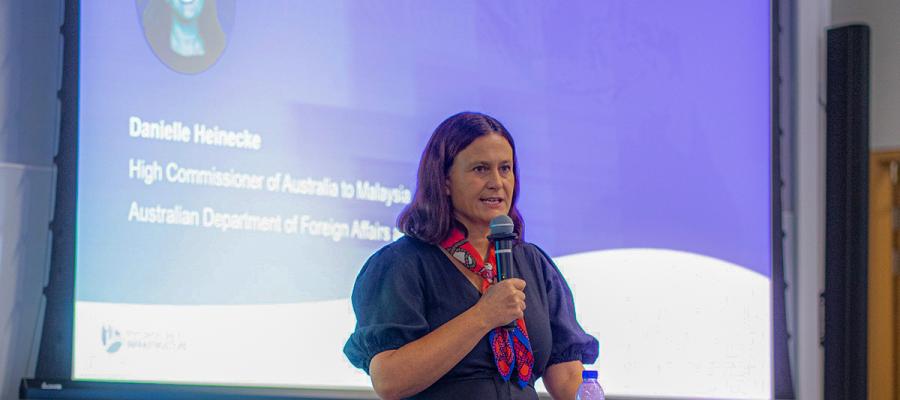If you are interested in partnering with us, please get in touch. Using P4I's flexible, innovative tools and diverse global expertise, we are confident we can design a response that is tailored to your needs.


Opening Remarks by H.E. Danielle Heinecke
at the Forum on Unlocking Sustainable Financing for Malaysia’s Green Economy: A Dialogue with Australia
on 3 June 2024 at Asia School of Business
Distinguished guests, ladies and gentlemen, good morning to you all.
Thank you for inviting me to deliver the keynote for this event today.
May I take the chance to acknowledge our kind colleagues from the Asia School of Business for warmly hosting us here today, and the University of Melbourne’s Melbourne Climate Futures (MCF) institute for making the trip from Australia to join us.
We’re pleased to be able to support the work of Australia’s academic centers of excellence to build deeper relationships across Southeast Asia, so naturally we are delighted that MCF has chosen to partner with us for this event.
And it’s great to see members of the public and private sector as well as academics convening to discuss an important but often overlooked topic.
We think about bolstering resiliency in energy systems, lowering carbon emissions and mitigating climate change but we often forget that marshalling private capital is a key part of the equation.
In order to navigate the energy transition, financing is critical.
In order to accelerate the deployment of renewables, capital is essential.
And in order to enable the deployment of capital, regulators and governments must send the right policy signals.
I’m pleased that officials from Malaysia’s Joint Committee of Climate Change (JC3), from Bursa Malaysia and from Bank Negara come together to join us in this important conversation.
I want to talk briefly about policy developments in Malaysia over the last couple of years. The Minister of Investment, Trade and Industry Tengku Zafrul has said that the transition to net-zero emissions is projected to cost over RM1.2 trillion, or around US$270 billion. While that represents a significant financing need, it also represents a major opportunity – across ASEAN, green initiatives have the potential to unlock US$300 billion in economic value.
We observe a range of policy measures involving financial regulators actively leading in developing the frameworks, financial infrastructure and incentive mix to unlock the deployment of capital.
The Securities Commission have issued the principles-based Sustainable and Responsible Investment Taxonomy.
The Central Bank has also issued the Climate Change and Principle-based Taxonomy, or CCPT, which provides a framework for classifying economic activities based on their alignment with climate objectives.
And they provide a necessary forum for engagement with member banks to seek counsel, coordinate and collaborate to build a greener and more resilient financial system.
Malaysian businesses are also stepping up to the challenge. Since 2016, Environmental, Social and Governance (ESG) reporting has become essential in annual financial disclosures for public listed companies.
Companies need to report on their Scope 1, 2 and 3 emissions.
They will need to find low carbon opportunities and model climate risk into their business strategies and supply chains.
On the ASEAN front, Malaysia’s Chair year creates the opportunity to be a regional leader. Driving regional initiatives is critical - across ASEAN, green initiatives have the potential to unlock US$300 billion in economic value.
Malaysia also plays a key role in developing and implementing the ASEAN’s Taxonomy for Sustainable Finance.
It is advocating for an interoperable and harmonized financial taxonomy to demonstrate credibility, instill confidence and attract sustainable investments.
To me, this demonstrates that Malaysia recognises the importance of green financing.
I am proud to say that Australia is on the same page.
Since 2014, Australia has been an issuer of green bonds.
This year, we will issue a comprehensive sustainable finance taxonomy. The Australian Sustainable Finance Institute and the Department of Treasury aims to release it by the middle of this year.
The taxonomy will focus on net zero aligned criteria in six hard to abate sectors: transport, agriculture, manufacturing, electricity generation, minerals mining and construction.
Last year, our Prime Minister announced the Southeast Asia Investment Financing Facility, a $2 billion program to invest in the region’s clean energy transition and critical supply chains.
This is a major undertaking and demonstrates our commitment to the region and our clear-eyed approach to practical action.
To support climate outcomes, Australia provides green loans that support to partner governments and the private sector through the Australian Infrastructure Finance Facility for the Pacific (AIFFP), Southeast Asia Investment Financing Facility (SEAIFF) and Export Finance Australia.
Just last week, we had colleagues from Export Finance Australia travel to Kuala Lumpur to attend the Financing Zero Summit, demonstrating a renewed commitment to engaging with the dynamic energy transition underway across the ASEAN region.
Australia actively contributes to multilateral climate funds and development banks to support climate adaptation and mitigation efforts.
Australia has taken significant steps to strengthen our climate finance and ensure it responds to our partners’ priorities.
Australia recognises the significance of the New Collective Quantified Goal (NCQG) on climate finance agreed at COP29 and is committed to continue working with other countries to support ambitious climate action.
The new goal includes a broader call for all countries to work together to scale up financing to developing countries, including through private finance.
We encourage all countries that have the capacity to support global efforts to do so.
Australia has strengthened our previous $2 billion climate finance commitment and expects to deliver $3 billion towards global climate finance efforts over 2020-25.
Now no speech is complete with at least a quick mention about the 70th Anniversary of Australia Malaysia bilateral relations (a song we are playing on repeat for the whole year).
So please humor me.
As we have done for nearly 7 decades, we are partnering with Malaysia and ready to support its ASEAN priorities.
Whether this is on the ASEAN Power Grid, increasing the value of trade and investment, or developing better enabling environments for doing business, there are a range of things we can learn from each other through partnership, and it’s dialogues like these where we can build the foundations for tangible actions taken together.
Driving private finance towards the achievement of climate mitigation and energy transition goals is a knotty problem - there is a need to deploy billions of dollars of capital in the right place, at the right time, at the right scale, to accelerate the path to net zero.
Dialogues such as these are part of the solution but so much of what is needed will happen afterwards. The private sector can take the lead, but it needs the right policy settings and signals in place. I’m pleased so many colleagues from the financial sector could be here today with us to discuss the blockers and the enablers for investment, and how we can work more closely together.
For our part, we are marshalling a range of institutions and mechanisms to enhance our cooperation with Malaysia on green tech, maritime decarbonization, and energy system planning. The Commonwealth Scientific and Research Organization (CSIRO), are partnering with federal government agencies on energy capacity planning and developing joint research and development outputs on the performance of battery energy storage in tropical climates.
We are working with Malaysia’s Ministry of Transport on port decarbonization and other state utilities to explore energy storage, through the Partnerships for Infrastructure program, or better known as P4I – our flagship infrastructure development program in Southeast Asia.
These are economic opportunities we must seize in the moment to ensure a just and equitable energy transition.
And to ensure we can all thrive in a net zero world.
Once again, I would like to congratulate Partnerships for Infrastructure, Melbourne Climate Futures and the Asia School of Business for pulling this together.
Thank you, ladies and gentlemen and I look forward to today’s discussion.
If you are interested in partnering with us, please get in touch. Using P4I's flexible, innovative tools and diverse global expertise, we are confident we can design a response that is tailored to your needs.
